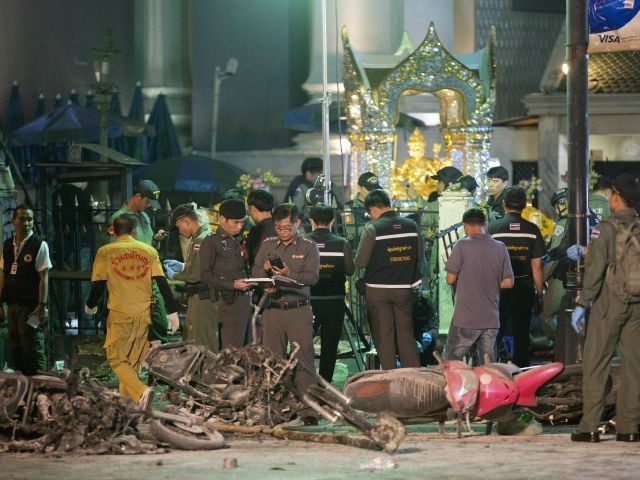On Saturday morning, Thai police raided an apartment on the outskirts of Bangkok and arrested a man they regard as a prime suspect in the horrific bombing attack on the Erawan Shrine last week, in which 20 people were killed. Word soon spread that the suspect was a Turkish citizen.
The Turkish embassy in Bangkok vigorously denied this rumor but, on Monday, the police issued arrest warrants for two more suspects, one of them a woman believed to have already fled back to Turkey.
The man already in custody has not been identified by the authorities at the time of this writing. According to Hurriyet Daily News, he is being held in military custody. He was renting a set of rooms in a run-down building on the eastern outskirts of Bangkok, where other residents report him conducting mysterious meetings with “a taller man with similar appearance.”
“Investigators say he was found with bomb-making equipment and dozens of fake passports, including a Turkish passport that was made public after the arrest,” the report adds.
This prompted the denials from the Turkish embassy, which is said to be seeking more information through both diplomatic channels and Interpol. Thai Defense Minister Prawit Wongsuwong also cautioned both the media and public to avoid jumping to any conclusions. “Don’t talk about Turkish or not Turkish. We have to investigate,” he admonished.
One theory about the identity of the suspect was advanced by Thai National Police spokesman Prawut Thavornsiri, who apparently did not get the Defense Minister’s memo about not spreading rumors or speculating before the investigation was complete. Thavornsiri said the perp could belong to a criminal gang that sells forged documents to illegal immigrants, and was therefore enraged by a Thai government crackdown on illegal immigration.
Another theory emerged when arrest warrants were issued for two more suspects, one of them a 26-year-old woman named Wanna Suansun, who was renting an apartment in a neighborhood close to the primary suspect’s rooms. Suansun’s apartment was raided on Sunday, turning up another stash of bomb-making materials, including gunpowder, fertilizer that can be converted into an explosive, and a radio controller from a toy car that could be used as a detonator.
She also owned a house, which was searched without finding any trace of her. Relatives told the police she has been out of the country for at least three months, most likely in Turkey, because her husband hails from there.
More specifically, the Associated Press speculates that Suansun’s husband might be a Uighur, or sympathetic toward that group, and the attack on the Erawan Shrine could have been an act of revenge for “Thailand’s forced repatriation of ethnic Uighurs to China in July.”
“Uighurs are related to Turks, and Turkey is home to a large Uighur community,” the AP explains. “The Erawan Shrine is especially popular with Chinese tourists, feeding the idea that it could be a target for people who believe the Uighurs are oppressed by China’s government. Beijing says some Uighurs are Islamist terrorists, and among them is a group that has been smuggled out of China to join Islamic State fighters in Syria.”
Not much is known about the man sought along with Suansun, aside from his appearance in a police sketch—short brown hair with a light beard and mustache—and National Police spokesman Thavornsiri suggesting that he used the name “Jusuf” or “Yusuf,” with the precise spelling left unclear. He reportedly lived in the apartment Suansun was renting.
One other controversial development in the investigation was Thai police awarding themselves the million-baht reward for capturing the first suspect. Critics say the reward was provided for information leading to an arrest, not to be given as a bonus to the police officers who actually took the suspect into custody, but National Police chief Somyot Poompanmounng said it was a deserved reward for “officials who did their job.”
This led to the rather unsightly spectacle of the chief sliding huge stacks of cash to his officers on national television—money the Coconuts Bangkok website notes is of uncertain provenance. Somyot Poompanmuang has said he personally advanced a third of the reward—worth about $84,000—while the rest was donated by “friends.”

COMMENTS
Please let us know if you're having issues with commenting.